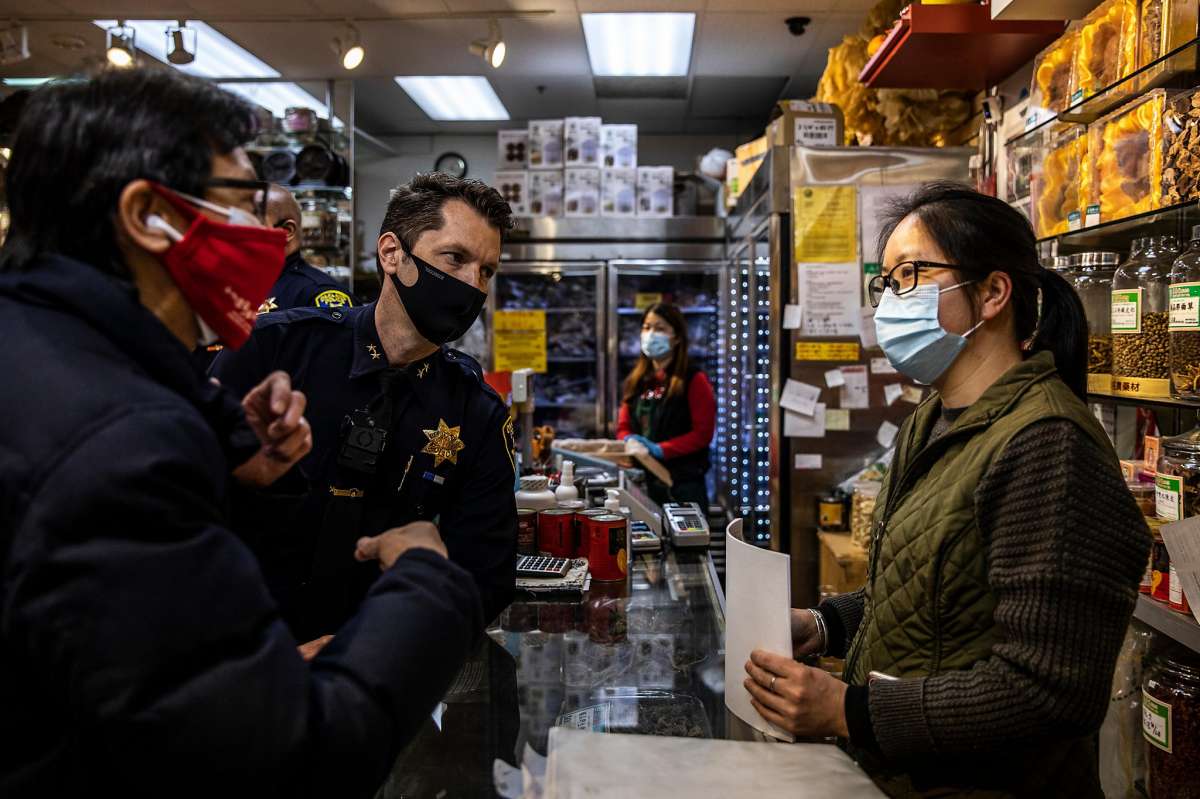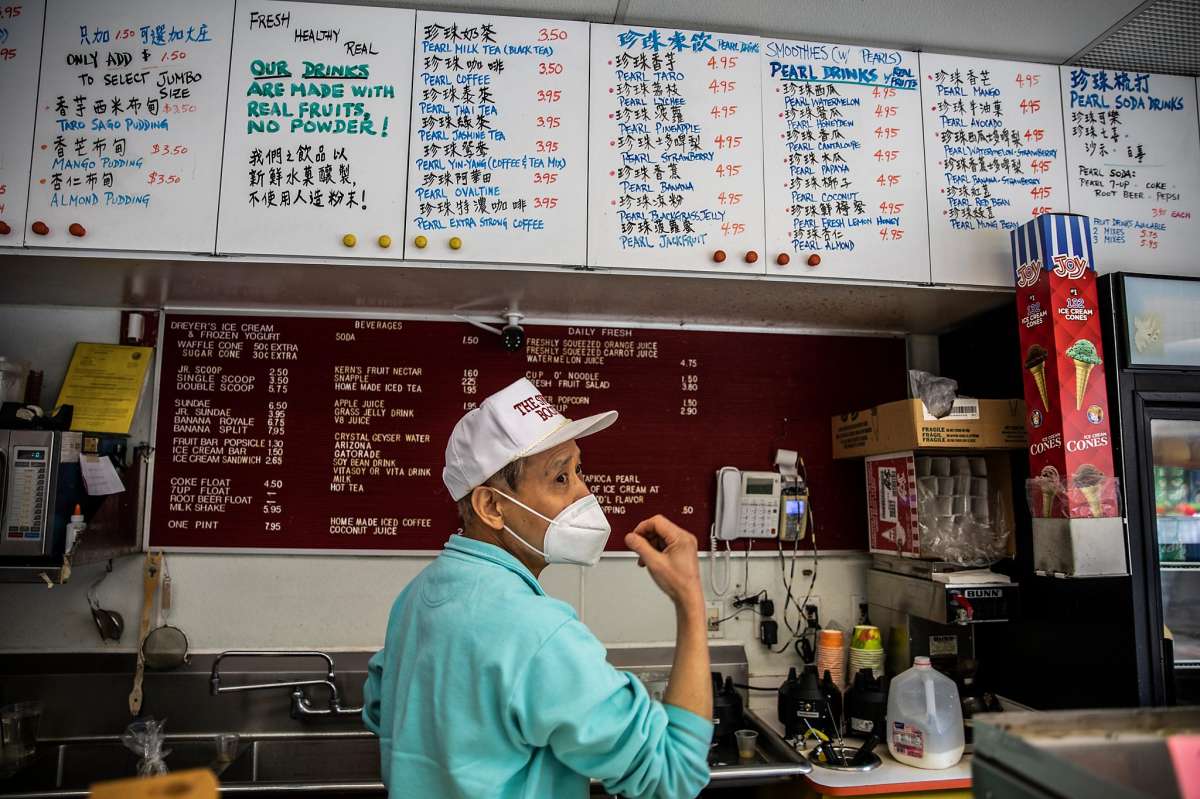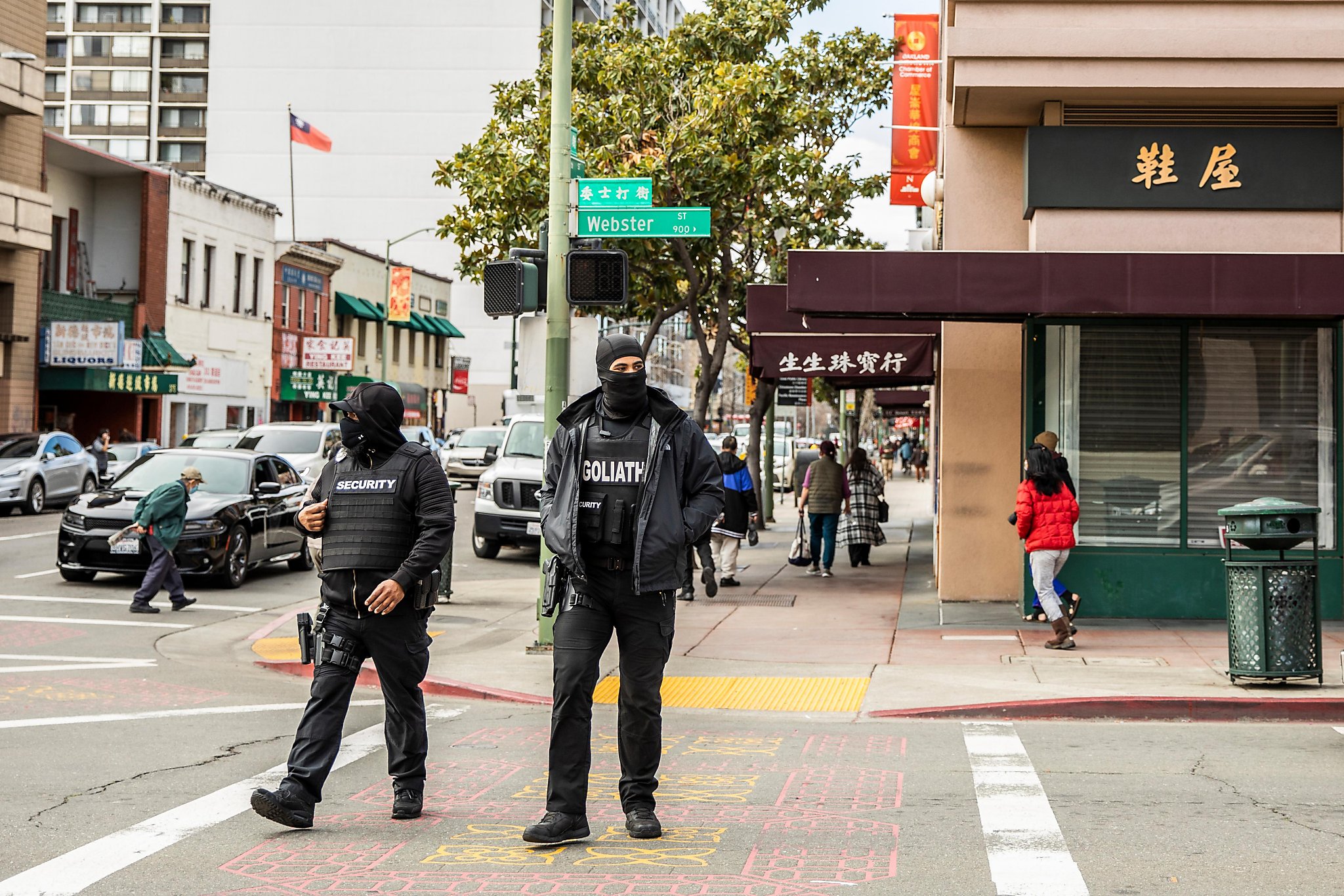When a string of high-profile crimes rattled Oakland Chinatown in February, city leaders descended on the neighborhood, decrying hate and professing support for victims.
Mayor Libby Schaaf pledged to fast-track grants for security cameras. Police Chief LeRonne Armstrong assigned an officer to be a liaison to the Chinese-speaking community. For a couple weeks, Armstrong’s command staff seemed to constantly pop up in the area, always trailed by news media.
The one thing they didn’t promise was more police. And in a town where budgets are tight and residents are questioning the whole law enforcement paradigm, adding officers is anything but easy.
“So many stores around here are boarding up their windows,” said Calvin Tong, owner of the Sweet Booth, a boba shop in Pacific Renaissance Plaza. Standing behind the counter on Feb. 16, he pointed to stores that were swathed in wood panels, including the Bank of America next door.
Volunteers in blue vests wandered through the plaza that afternoon, hoping the display of uniforms would provide a sense of order. The lunch crowds had thinned out; the courtyard benches were mostly empty. A shopkeeper at an herb store blocked the doorway with racks of spices and dried fish. Across the street, at a popular banh mi sandwich shop, workers left money in the tip jar in case anyone tried to steal it.
“If they get an empty jar, they’ll give me trouble,” owner Anh Nguyen said with a wan smile.

At a time when so many things in society are fraying, Oakland Chinatown became a focal point, besieged by crimes of opportunity that seemed loosely related to the pandemic and the depressed economy. A few were caught on surveillance videos that went viral in early February. One showed an elderly man walking down Harrison Street when an assailant came up from behind and pushed him to the pavement. In another, a man grabbed money from the hands of a shopper at a store counter.
Crime has gripped this retail district before. Thieves occasionally target the neighborhood because many older adults tend to carry cash, said Carl Chan, president of the Oakland Chinatown Chamber of Commerce. But the recent series of attacks provoked an unusually strong reaction, fueled by two historical moments — a national reckoning over hate crimes against Asian Americans and a local battle over whether to slash the police budget.
“In Oakland, we became the epicenter of almost everything,” Chan said.
Social media complicated the situation by allowing the videos to loop over and over again, raw and unmediated. Within days, actors Daniel Dae Kim and Daniel Wu offered a $25,000 reward for information about the attacker who pushed the man on Harrison Street, seeing the incident as a symptom of systemic racism. The politics heated up in Oakland, where Chan and fellow Chamber of Commerce members called for better and more consistent policing. Other activists touted social programs — instead of law enforcement — as the key to public safety.
“‘Defund’ feels like a bit of a confusing message sometimes, but really the conversation is, ‘How do we have more resources ... to go into secure housing, and good jobs, and health care, and mental health?’” asked Alvina Wong, campaign and organizing director at the Asian Pacific Environmental Network. The group helped organize rallies to promote peace over the Lunar New Year, a holiday traditionally marked by large gatherings and street bazaars.
As the spotlight intensified, city officials found themselves in an awkward position. The administration had cut some police services in December, part of a citywide effort to patch a $62 million budget hole. Among the casualties were foot patrols in Chinatown, which caused such an outcry that Schaaf and Armstrong quickly dedicated two officers to work with non-English-speaking residents in Chinatown and nearby Fruitvale.

Eyes also turned to Council President Nikki Fortunato Bas, whose district includes Chinatown. A committed progressive, she pressed, unsuccessfully, for deeper police cuts when the council approved its budget in June. Bas co-chairs the city’s Reimagining Public Safety Task Force, which aims to halve the police budget and shift the money toward social services.
“It’s a challenging moment, certainly, with the crime that has been happening during this pandemic,” the council president said. “But I think it’s also a moment where we can come together and be creative.” She argued that communities are safer when the city invests in business districts, parks and other infrastructure, rather than adding police officers.
Some business owners see it differently.
“Of course we want more police,” said Sasha Leung, owner of a dress shop in Pacific Renaissance Plaza. She closes two hours early, at 4 p.m., in part because business dropped during the pandemic, but also to avoid being alone after dark.
Others, such as Police Commission Chair Regina Jackson, cautioned the city to distribute police equitably, rather than pushing resources toward areas that draw the most media attention. Jackson is also president of the East Oakland Youth Development Center, in a neighborhood scarred by crime and poverty — where many residents feel the city isn’t listening.
“I like where Chief Armstrong is going in terms of the liaison role,” Jackson said. “We just need a few more of them.”
Yet even as it’s thrust to the center of a citywide policy debate, Chinatown seems wounded by the wave of attacks in February, on top of months of economic stagnation. Storefronts are boarded up. Many shops have red “Save Chinatown” posters in their windows, each with a logo depicting the Year of the Ox, alongside police phone numbers to report assaults or robberies. Surveillance cameras hang from buildings.
Business owners raised more than $85,000 to hire private armed security guards to patrol Chinatown for the next few weeks, supplementing a strained police force and the volunteer teams of blue-vested ambassadors. Such community-driven safety measures have historical antecedents, Chan said.
He remembered a similar effort in 2010, after two teenagers beat an older Chinese man to death in front of the Fox Theater in Uptown. Less than three months later, Oakland laid off 80 police officeers — including one of two foot patrol officers in Chinatown — to cope with a widening budget deficit. Feeling embattled, merchants installed surveillance cameras throughout the district. Volunteer ambassadors cruised the sidewalks.
Chan’s voice breaks when he recalls the events of 2010. For months, he helped the family of the 59-year-old beating victim, Tian Sheng Yu, navigate an unfamiliar court system. In the ensuing years, Chan kept lobbying for community safety. Whenever a protest got out of hand downtown, leaving windows shattered in Chinatown, Chan stood before a scrum of TV cameras and begged the city for more protection.
He is wary of the movement to strip funding from the Police Department.
“I’ve talked to many organizations, businesses, and residents in Chinatown, and asked the same question — ‘Is it OK for us to request the help of the police?’” he said. “So far, the answer is ‘Yes.’”
San Francisco Chronicle staff photographer Stephen Lam contributed to this report.
Rachel Swan is a San Francisco Chronicle staff writer. Email: rswan@sfchronicle.com Twitter: @rachelswan

